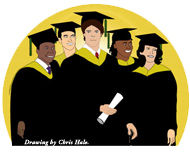Issues in Graduate Education
Function of the Master's Degree in Teaching History
 In his introduction to the AHA pamphlet, Retrieving the Master's Degree from the Dustbin of History, David Trask noted that "The master's degree for historians has the additional burden of enriching the nation's sense of the past." (page v) This quote resonated with me as a history teacher because it is central to what I see as my mission in the classroom—to inculcate an appreciation and excitement for the study of history.
In his introduction to the AHA pamphlet, Retrieving the Master's Degree from the Dustbin of History, David Trask noted that "The master's degree for historians has the additional burden of enriching the nation's sense of the past." (page v) This quote resonated with me as a history teacher because it is central to what I see as my mission in the classroom—to inculcate an appreciation and excitement for the study of history.
To enable me to begin to address this task my master's degree started me on the journey of mastering the hows of doing history. First and foremost it gave me a useful knowledge of the literature of the discipline and the tools to expand that knowledge into a lifelong pursuit; it enhanced the scope and degree of my content knowledge, deepened my understanding of the themes of history, and strengthened my awareness of the questions to ask to unpack historical sources and resources in my search for answers. It gave me the confidence to see teaching and research as complementary rather than exclusionary elements; the teacher and the scholar each combine the intellectual and practical aspects of the historian but not necessarily to the same degree or to the same purpose.
My master's degree helped me to understand how to collate a large body of material and to shape a narrative to make the material accessible for students regardless of the course I was teaching. Having had the opportunity to construct and teach basic survey courses in U.S., European, and world histories, as well as a number of regional and theme-related courses (Latin American history, Middle Eastern history, 20th-century revolutions, terrorism, social constructions of race and gender, to name a few), I have had a great deal of practice with this skill and am always cognizant of how vital it is to my students' understanding of the societies we encounter.
Additionally, I gleaned from my graduate studies the importance of complicating the narrative with multiple perspectives; this fed—and continues to feed—my need to help students analyze, interpret, and synthesize materials; see nuances as they read; and understand the importance of points of view in each source they study. This usually leads students to come to an awareness of history as a construct and allows them to begin to see patterns of continuity and change across time and place.
Classroom discourse is immeasurably enhanced because I am comfortable taking students' questions, ideas, and comments and weaving them into the narrative or demonstrating why they don't fit. This blending of content, skills, and pedagogy leads to an interactive classroom environment that encourages students in their pursuits to understand the past and affords them greater confidence when looking at the present to see references to the past.
Furthermore, my master's degree increased my confidence in ways that have helped me to form a vision for a broad program in history for my department, to undertake numerous adventures in designing curricula, to relish the mentoring of young teachers, and to embark on a number of professional opportunities to give workshops and to participate in conferences. As a department head in an independent school, I hire teachers and have numerous conversations with aspiring teachers; encouragement to earn a master's in history is always a theme I introduce in those dialogues.
I feel that my love for teaching and for the teaching of history are direct consequences of the work I did as a graduate student of history and of the scholarship and pedagogy that was modeled for me in my graduate classrooms.
—Helen Grady is chair of the history department at Springside School, Philadelphia.
Tags: Career Diversity for Historians Graduate Education
Comment
Please read our commenting and letters policy before submitting.






